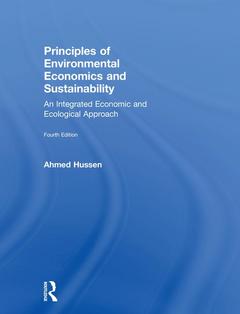Principles of Environmental Economics and Sustainability (4th Ed.) An Integrated Economic and Ecological Approach
Auteur : Hussen Ahmed

Principles of Environmental Economics and Sustainability was the first textbook to make a serious attempt to systematically integrate ecological and economic principles. It successfully introduced ecological perspectives to the study of environmental economics while maintaining the integrity of the standard economic approach.
In this new edition this notion continues to be embraced while also offering readers several further features, including greater in-depth coverage of the economics of climate change, expanded reference sections, and an updated and expanded "review and discussion questions" section. The unique integration of both mainstream and ecological approaches which this textbook provides proves particularly illuminating in relation to the following topics:
- economics of climate change
- environmental valuation
- cost?benefit analysis and the environment
- sustainability in theory and practice
- limits to growth
- the role of technology
- the business case for environmental sustainability.
Written in a clear and accessible way, this key textbook is an excellent resource for all students of environmental economics. With study tools including learning objectives, case studies, and charts and graphs, this volume uses real-world examples to engage both students and academics within the field.
This text also accompanied by a Companion Website including resources for both students and instructors. Here you will find student study questions, interactive quizzes, and an instructor manual composed of lecture PowerPoint templates.
Introduction: what is environmental economics all about? PART I Environmental economics: foundational concepts, theories, and perspectives 1. The natural environment and the human economy: the neoclassical economic perspective 2. The natural environment and the human economy: an ecological perspective 3. Trade-offs: economic activity versus environmental quality PART II The environment: pollution control, policy instruments, valuation, and project evaluation 4. The economic theory of pollution control: the optimal level of pollution 5. The economics of environmental regulations: emission standards and effluent charges 6. The economics of environmental regulations: transferable emission credits and the macroeconomic effects of environmental regulation 7. Economic valuation of environmental goods and services 8. Frameworks for the economic appraisal of environmental projects: cost–benefit analysis and others. PART III Climate change: the new environmental reality 9. The economics of climate change PART IV The perennial debates on the biophysical limits to economic growth and the emerging paradigm of sustainable development 10. Biophysical limits to economic growth: Malthusian perspectives 11. Biophysical limits to economic growth: the neoclassical economic perspective 12. The economics of sustainability 13. Green accounting and alternative indicators of sustainability 14. The business case for environmental sustainability
Ahmed Hussen is the Edward and Virginia van Dalson Professor of Economics at Kalamazoo College, USA. He is co-founder of the environmental study program at the college and currently serves as the Chair of the Department of Economics and Business. In addition he has taught and conducted research internationally in Japan, Zimbabwe, and Botswana and has been awarded "excellence in teaching" in recognition of his skill as a teacher and dedication to his students.
Date de parution : 07-2018
18.9x24.6 cm
Date de parution : 07-2018
18.9x24.6 cm
Thèmes de Principles of Environmental Economics and Sustainability :
Mots-clés :
Marginal Pollution Control Cost; Ecological Economics; MCC; Climate Change; Biophysical Limits; Biodiversity; Vice Versa; Sustainability; Human Material Progress; environmental economics; Human Economy; ecosystem services; Neoclassical Worldview; green accounting; Weak Sustainability; neoclassical economics; Strong Sustainability; pollution; Effluent Charge; economic valuation; Production Possibility Frontier; environmental regulation; Pollution Control Technology; CBA; Pollution Damage Costs; development economics; EDP; Pollution Control Policy Instruments; EKC Hypothesis; EKC Relationship; SP Valuation Method; Effluent Tax; Tpi; Paris Climate Agreement; ARP; GHG Abatement Cost; CVM; SMS Approach



